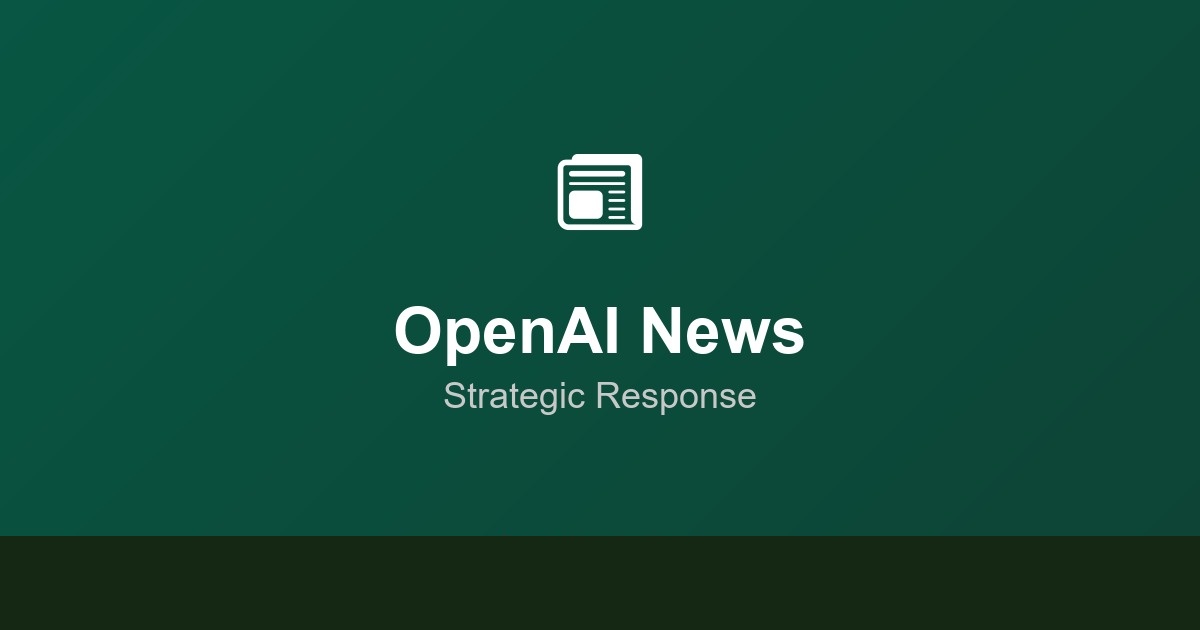From Scroll to Strategy: Why OpenAI's Move on Morning News is a Wake-Up Call for Enterprise

The headline, 'OpenAI wants ChatGPT to replace your morning news scroll,' might sound like another consumer tech disruption, but for enterprise leaders, it signals a seismic shift in how we approach information consumption and strategic decision-making. The endless morning scroll through news feeds, a ritual for many, is notoriously inefficient—a hunt for signal in a sea of noise. OpenAI's introduction of features like ChatGPT Pulse, which delivers personalized, AI-curated briefings, is not just about convenience; it's about transforming a passive, time-consuming activity into a strategic, high-ROI asset for businesses.
The headline, 'OpenAI wants ChatGPT to replace your morning news scroll,' might sound like another consumer tech disruption, but for enterprise leaders, it signals a seismic shift in how we approach information consumption and strategic decision-making. The endless morning scroll through news feeds, a ritual for many, is notoriously inefficient—a hunt for signal in a sea of noise. OpenAI's introduction of features like ChatGPT Pulse, which delivers personalized, AI-curated briefings, is not just about convenience; it's about transforming a passive, time-consuming activity into a strategic, high-ROI asset for businesses.
For the enterprise, the value proposition of AI-driven information synthesis extends far beyond simply saving a few minutes each morning. It directly addresses the core challenges of information overload and decision paralysis that plague many organizations. Business leaders are constantly inundated with market data, competitor analysis, and industry news. The ability to receive a condensed, tailored brief that highlights only the most critical and relevant updates can significantly enhance the speed and quality of strategic decisions. This is not merely about staying informed; it's about achieving a competitive advantage through superior, timely intelligence.
The return on investment (ROI) for adopting such AI-powered information tools can be measured in several key areas. Firstly, there is the direct and quantifiable impact of executive time saved. By automating the initial filtering and summarization of information, leaders can redirect their focus towards higher-value activities such as strategic planning and execution. Secondly, there is the less tangible but arguably more significant benefit of improved decision-making agility. In a rapidly evolving market, the ability to quickly identify and react to emerging trends or threats can be the difference between success and failure. Finally, the potential for integrating these tools with internal, proprietary data sources opens up the possibility of a truly hyper-personalized business intelligence engine, capable of delivering insights that are not just relevant to the market, but to the specific context of your organization.
However, the transition to this new information paradigm is not without its challenges. For enterprise adoption to be successful, critical considerations around data security and privacy must be addressed. The prospect of feeding sensitive company information into external large language models (LLMs) will require robust security protocols and clear governance frameworks. Furthermore, the inherent risks of bias and inaccuracy in AI-generated content necessitate a continued emphasis on critical evaluation and human oversight. The most effective implementations will be those that strike a balance between the efficiency of AI and the discerning judgment of human experts.
Ultimately, the move by companies like OpenAI to revolutionize our daily information habits is a clear indicator of the future of business intelligence. Enterprise leaders should not view this as a distant trend but as an immediate opportunity to re-evaluate and optimize their own information workflows. The era of passive news consumption is drawing to a close. The future belongs to those who can effectively leverage AI to transform information into a strategic, actionable asset. The question for every enterprise is no longer *if* they should adopt these tools, but *how* quickly and effectively they can integrate them to drive measurable business outcomes.
References
- Industry research and analysis from leading AI technology providers and research institutions.
- Enterprise AI implementation case studies and ROI analysis from Fortune 500 companies.
- Market research reports from Gartner, McKinsey, and other leading consulting firms on AI adoption trends.
- Technical documentation and whitepapers from AI platform vendors and service providers.
- Regulatory compliance frameworks and guidelines for AI implementation in enterprise environments.
Ready to Implement AI in Your Enterprise?
Our team of AI experts can help you navigate the complex landscape of AI infrastructure and implementation. Book a free consultation to discuss your specific needs.
Book Free Consultation